Pregnancy Complications
Infant- and Family-Centered Developmental Care
Respiratory Infections
Neonatal Eye Health
Hygiene
Rare Diseases
RSV, or Respiratory Syncytial Virus, is the leading cause of respiratory infections in infants—and it doesn’t just affect preterm babies. Even healthy, full-term newborns are at risk of severe RSV illness, which can result in hospitalization and long-term complications. Despite its widespread impact, RSV remains underrecognized. This site aims to change that.
Here, you'll find everything you need to know about RSV: what it is, how it spreads, the symptoms to watch for, and how to help protect all infants from this serious yet preventable disease. Most importantly, we’re amplifying the voices of families—parents who’ve faced RSV firsthand share their experiences to raise awareness, offer support, and help others recognize the signs early.
Respiratory Syncytial Virus (RSV) is a common seasonal virus that affects the respiratory system. While RSV circulates year-round, outbreaks occur most frequently during the colder months—fall, winter, and spring—in temperate regions. RSV is found worldwide and is the leading cause of respiratory infections in children under five.
Each year, RSV leads to approximately 3 million hospitalizations globally, with 75% of those admissions involving infants under one year old.[1] That makes RSV one of the most significant threats to infant health around the world.
Reference:
[1] Li Y et al. Global, regional, and national disease burden estimates of acute lower respiratory infections due to respiratory syncytial virus in children younger than 5 years in 2019: a systematic analysis. Lancet. 2022 May 28;399(10340):2047-2064. doi: https://doi.org/10.1016/S0140-6736(22)00478-0.
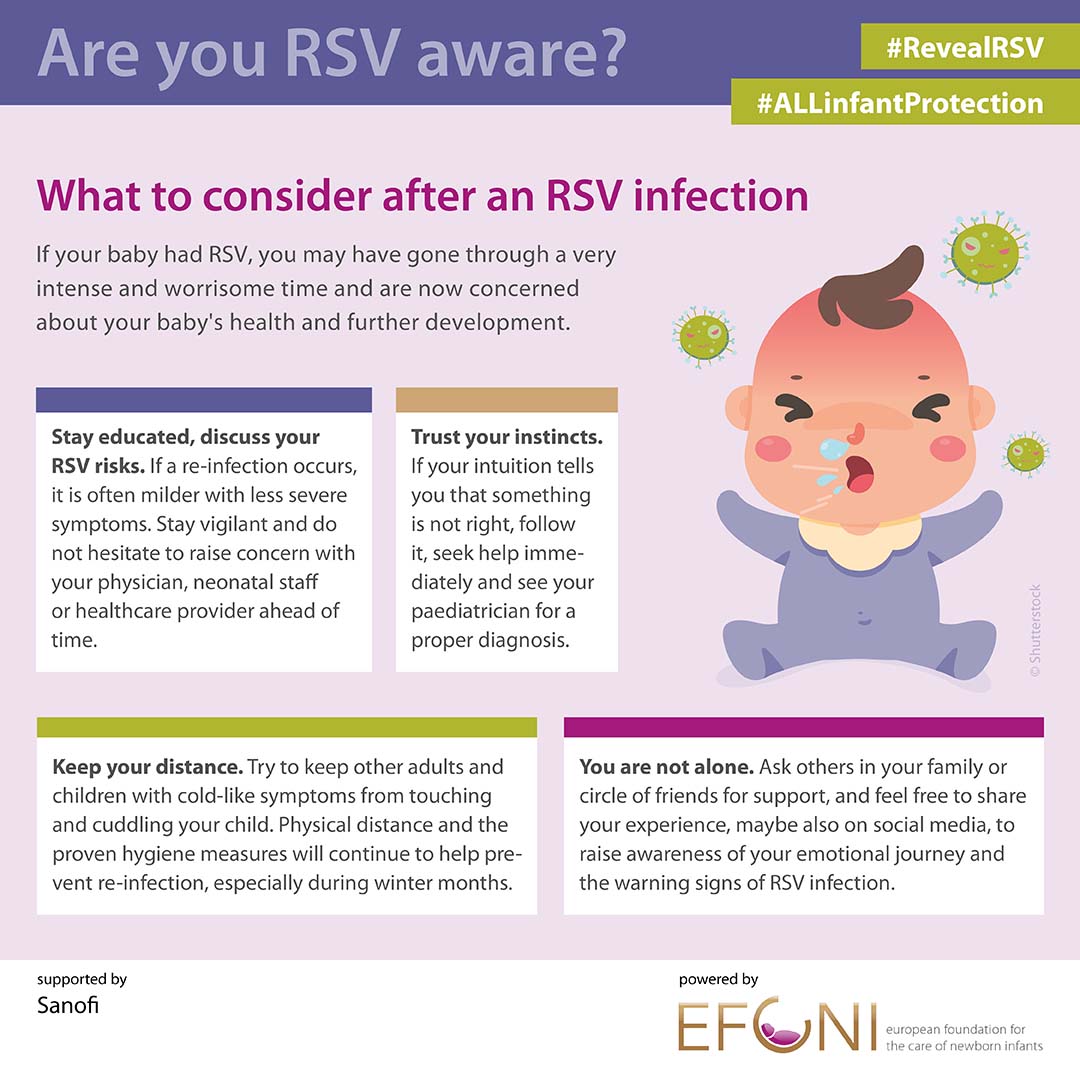
Respiratory Syncytial Virus (RSV) is a highly contagious and common virus that spreads easily—and it can infect children more than once. For many families, a severe RSV infection leads to multiple or extended hospital stays, creating a physically and emotionally draining experience for both infants and parents. Even after recovery, the risk of re-infection remains, especially during RSV season. That’s why continued caution and preventive measures are so important.
Basic hygiene and distancing strategies—many of which became familiar during the COVID-19 pandemic—remain effective in helping to prevent RSV transmission and reduce the chance of re-infection in vulnerable infants.
Protect your child by staying consistent with these steps:
Remember: Stay alert. Know the symptoms. Take action early to protect your child from RSV and reduce the risk of re-infection.
References:
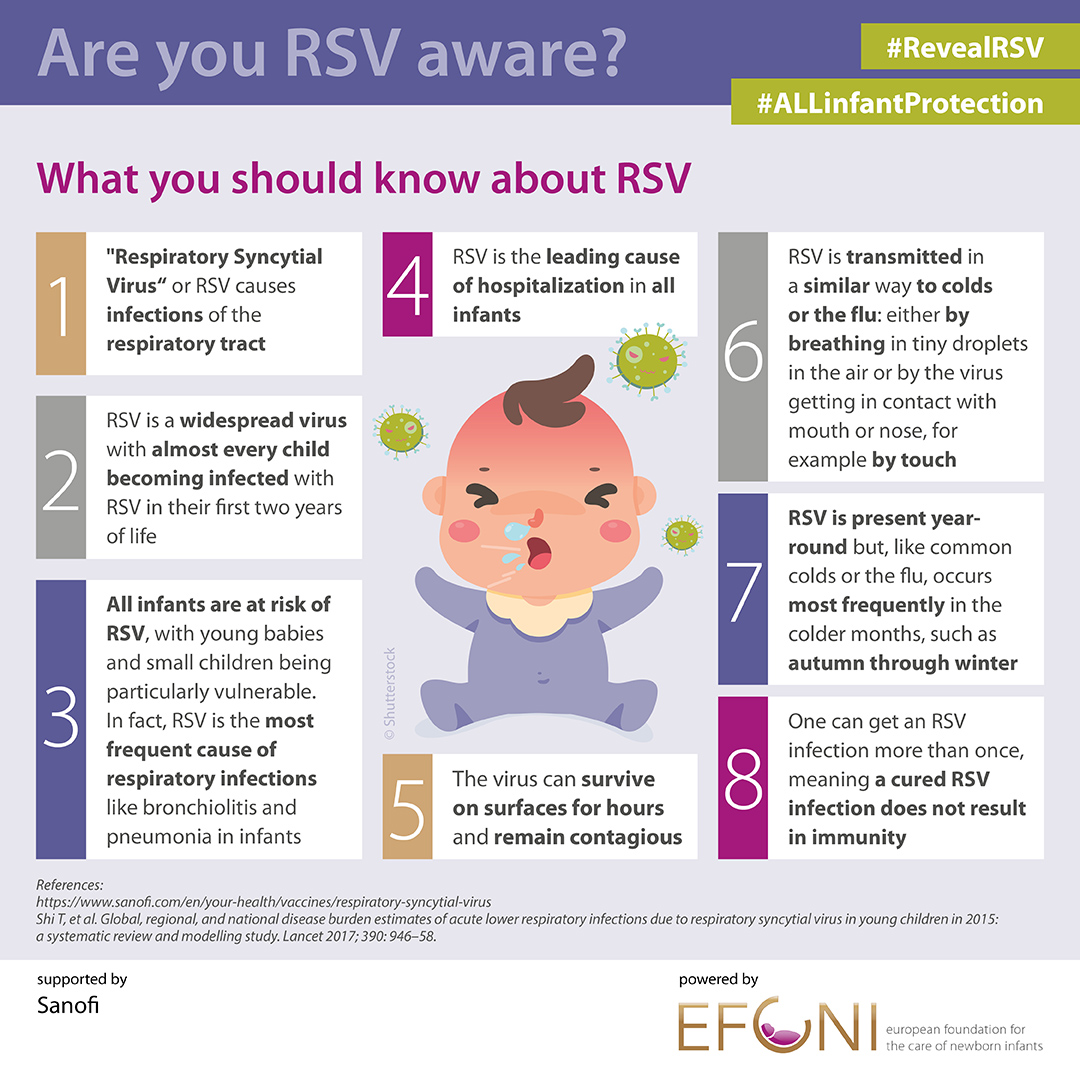
How RSV Spreads:
RSV enters the body through the eyes, nose, or mouth. Like the flu or common cold, it spreads through tiny droplets in the air when an infected person coughs or sneezes. It also spreads through direct contact—like touching hands—or by touching contaminated surfaces. RSV can survive for hours on hard surfaces, making it highly contagious. That’s why nearly 90% of all children contract RSV by the age of two.[1]
Who’s at Risk:
All infants are at risk of RSV, not just those born prematurely or with underlying conditions. In fact, 80% of infants hospitalized with severe RSV are born full-term and were previously healthy.[2] While RSV may start with mild, cold-like symptoms, it can quickly develop into serious respiratory issues, including bronchiolitis or pneumonia.
Even more concerning, RSV can lead to long-term complications like wheezing or asthma. Despite its global impact, RSV remains an underrecognized threat to infant health.
Be RSV Aware – Protect Your Child
Trust your instincts—seek care if your child shows signs of illness
Early awareness saves lives. Let’s work together to spread knowledge and stop RSV in its tracks.
References:
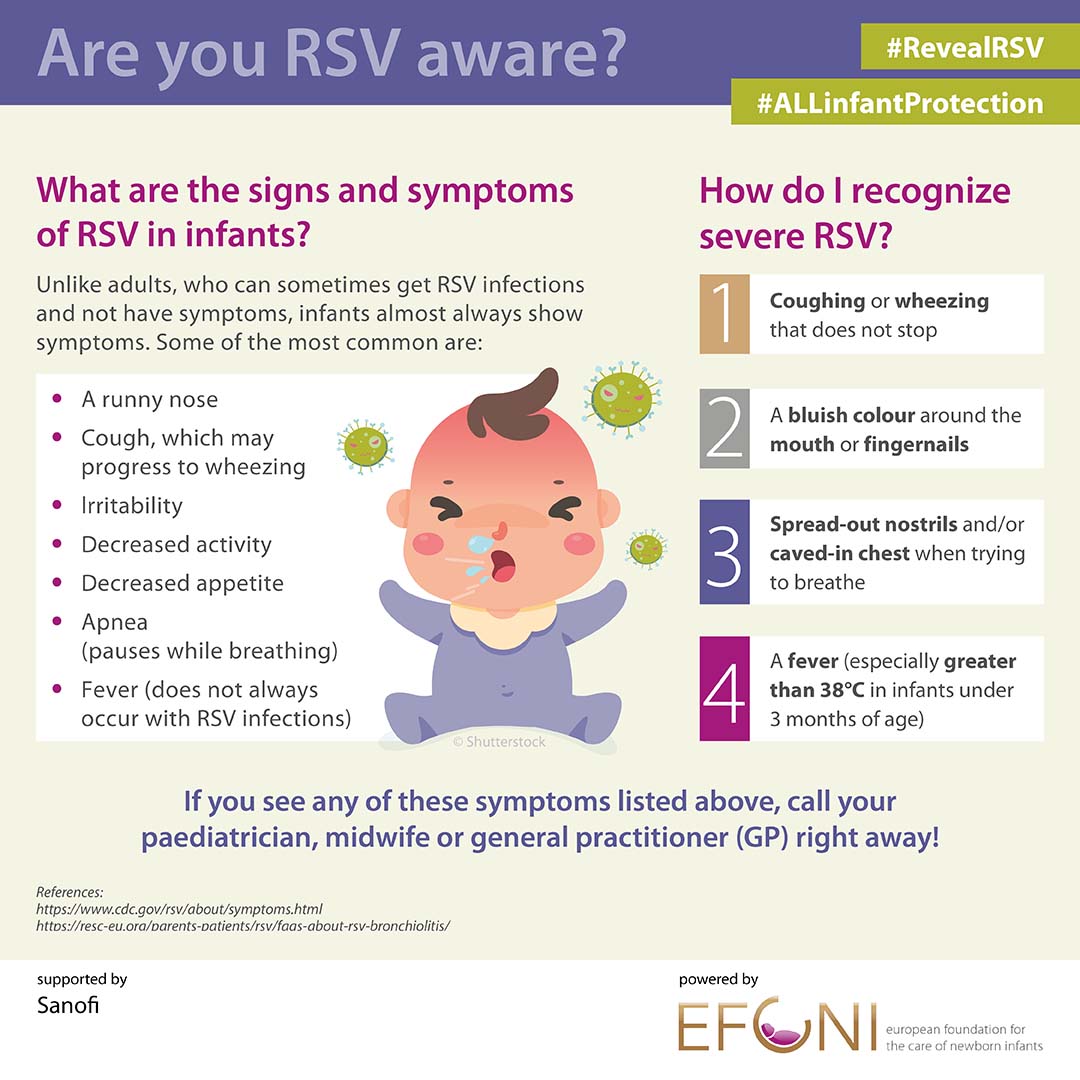
Early Signs of RSV:
RSV often begins with mild, cold-like symptoms that are easy to overlook. These early signs can include:
While these symptoms may seem harmless at first, RSV can quickly progress, especially in infants under 6 months old.
Serious RSV Symptoms to Watch For:
RSV can lead to infections in the lungs and airways, causing significant breathing difficulties. If your baby’s condition worsens or symptoms persist, don’t wait—early action can prevent serious complications. Be especially vigilant during your baby’s first months at home.
Seek immediate medical attention if your baby shows any of the following:
Remember: If your child shows any of these symptoms, call your pediatrician or seek emergency care immediately. It's always better to get a professional opinion—even if it turns out to be nothing serious.
References:
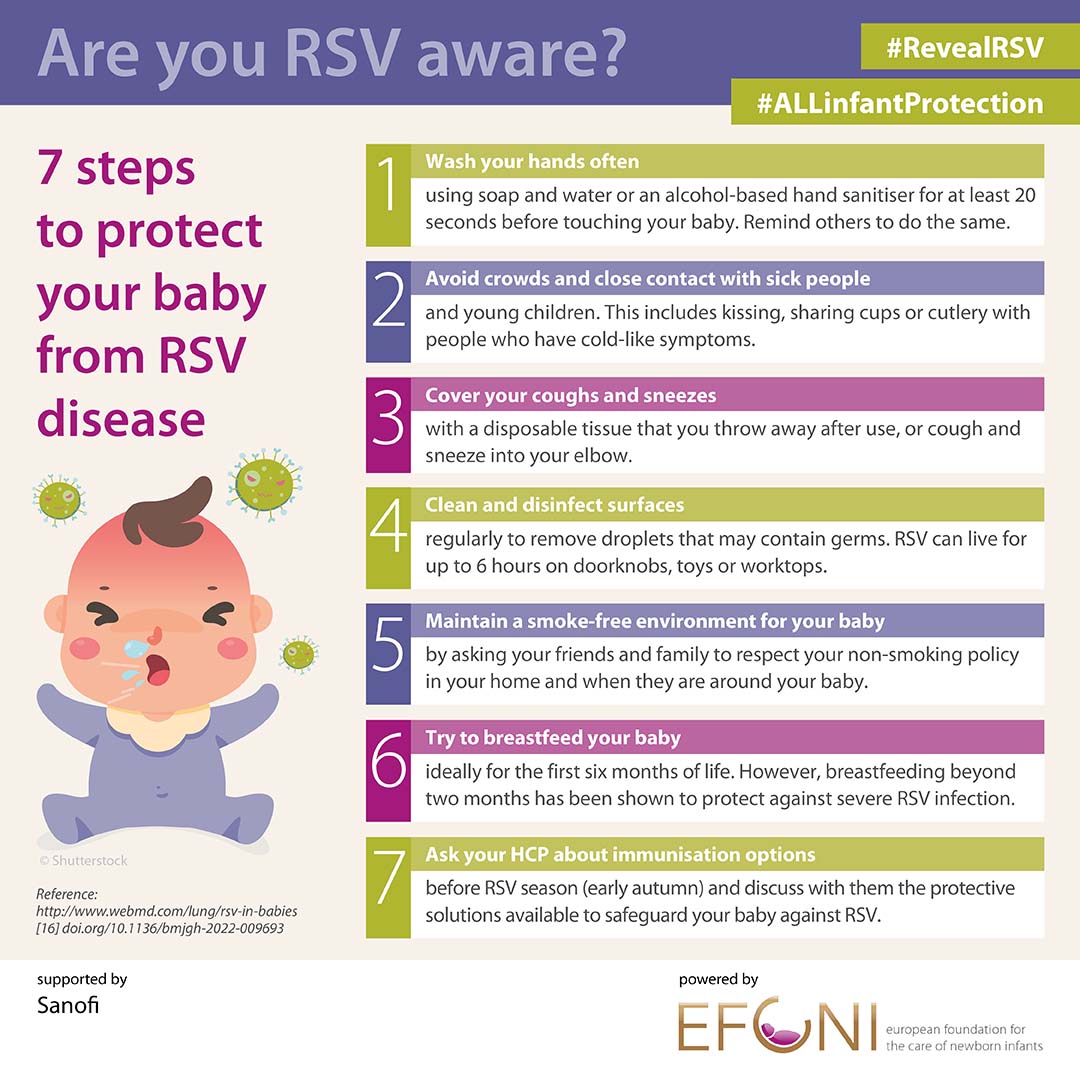
Everyone loves to cuddle a newborn or play with a smiling toddler—but close contact can also spread harmful germs. RSV is highly contagious, and infants are especially vulnerable. The good news? Simple hygiene habits can go a long way in helping protect your baby from RSV and other respiratory infections.
Follow these proven steps to reduce the risk of RSV infection:
Avoid crowded places and sick individuals. Keep your baby away from anyone showing cold-like symptoms. Avoid close contact such as kissing or sharing utensils with people who may be ill.
Wash your hands frequently. Use soap and water for at least 20 seconds—especially before touching your baby. If soap isn’t available, use an alcohol-based hand sanitizer.
Stay home when you're sick. Don’t risk spreading germs to others. If your baby shows symptoms, keep them home from daycare or public spaces.
Practice good respiratory hygiene. Always cover your mouth and nose with a tissue when coughing or sneezing, and throw it away immediately. If no tissue is available, use your elbow.
Breastfeed if possible. Breastfeeding supports your baby’s immune system and helps lower the risk of RSV infection.
Remember: Spread the word, not the virus. Share these tips with family, friends, and caregivers to help protect all infants from RSV.
References:
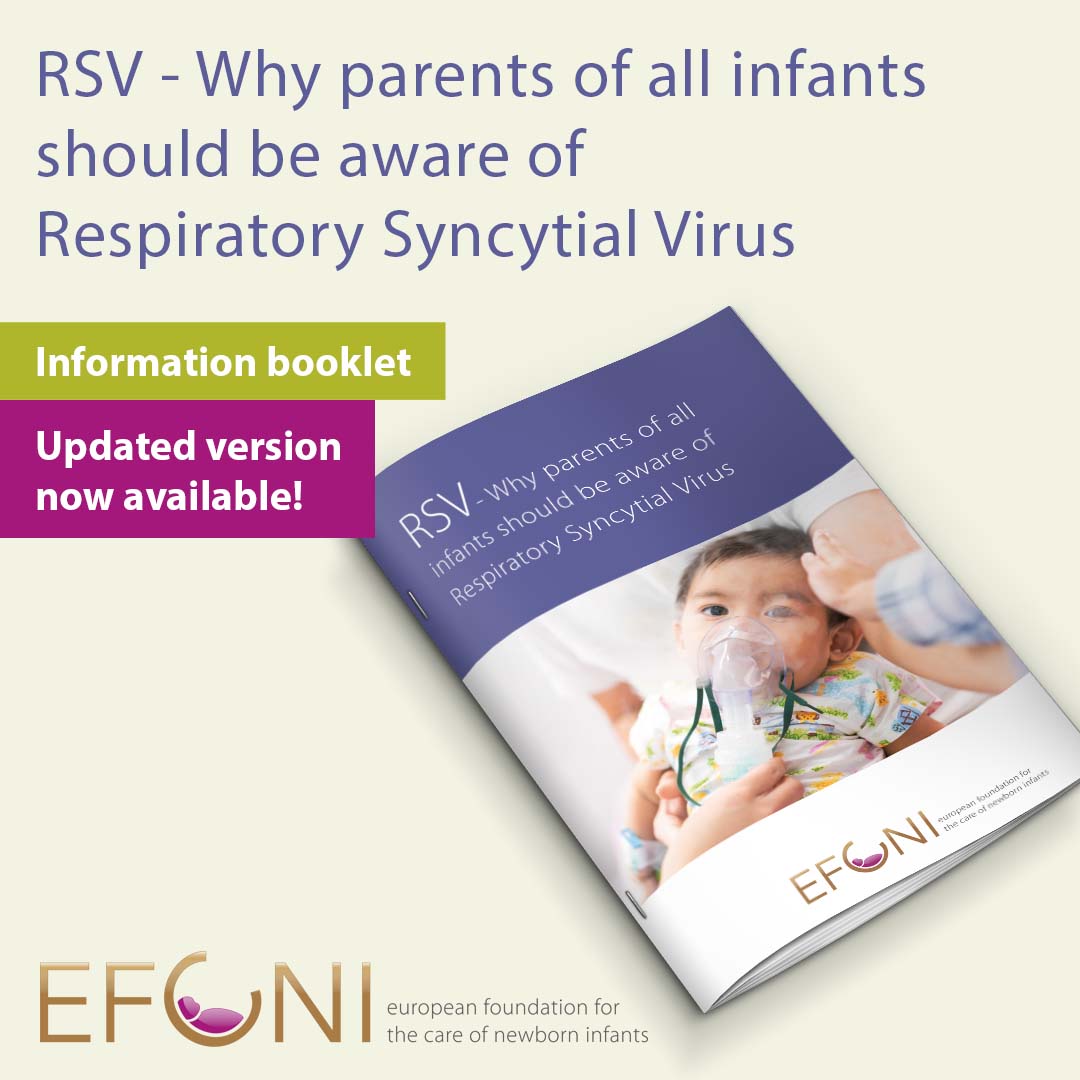
Every parent wants to make informed decisions about their child’s health and well-being. That includes understanding potential risks—like RSV—and knowing how to take effective steps to protect their baby.
To support parents, we've teamed up with leading experts in neonatology, pediatrics, infectious diseases, and RSV research to create a comprehensive and accessible resource:
"Why Parents of All Infants Should Be Aware of Respiratory Syncytial Virus"
This downloadable parent booklet offers practical, easy-to-understand guidance on RSV, including:
What RSV is and how it spreads
The signs and symptoms to watch for
How to reduce your baby’s risk of infection or re-infection
Insights from healthcare professionals
Personal tips and real-life advice from fellow parents
Helpful infographics to make complex information clear
Whether you're a new parent or simply want to stay informed, this guide empowers you to recognize RSV, respond early, and help keep your child safe and healthy.
Download your free copy now and get the knowledge you need to protect your baby.
Parents have an innate sense when something isn’t right with their child. For those who’ve faced RSV, the journey can be filled with fear, confusion, and unanswered questions. In these personal accounts, mothers and fathers speak candidly about their child’s RSV diagnosis, hospital stays, emotional stress, and how the illness affected their entire family.
They share the unpredictable nature of RSV, the challenges of recovery, and how it shaped their child’s development and their lives. These honest, heartfelt stories highlight the critical need for better awareness and stronger RSV prevention for all infants.
We invite you to explore our collection of RSV stories. Each one carries a clear message: every infant deserves protection, and every parent deserves knowledge and support. Together, we can raise awareness and push for lasting prevention solutions.
Thank you for watching and sharing.
“RSV has completely changed the way we parent. Not only are we more cognizant of this incredibly dangerous virus – warning signs and symptoms – but we are also more confident in advocating for the health and wellbeing of our children. We have vowed to do everything in our power to help families avoid the horrific days we spent at the hospital watching our son fight for his life when he had RSV. No one should have to endure this Really Scary Virus alone.”
“As a first time parent of a newborn baby with RSV it can feel scary and unknown; trust your instincts and always get a medical opinion if you think there is something wrong. A cold can turn into something more serious if left unchecked so it is always best to get help and support if you are unsure. We are so grateful for the medical help we received to help our daughter fully recover.”
You can explore all of our RSV family stories, including short video clips, in the dedicated “RSV Stories” playlist on our YouTube channel.
These personal accounts offer powerful insights into the real-life impact of RSV—and your support in sharing them matters.
By sharing these videos and resources with your friends, family, and online community, you help raise awareness of RSV and its potential consequences.
Your simple action can make a big difference in protecting more infants and supporting families worldwide.
Thank you for listening, sharing, and helping to spread the word. Together, we can make RSV awareness a priority.

To help parents and healthcare professionals better understand Respiratory Syncytial Virus (RSV), we’ve created a four-part interview series featuring Professor Luc Zimmermann, Professor of Pediatrics and Neonatology and former Medical Director at GFCNI (EFCNI).
In these short, informative episodes, Professor Zimmermann answers some of the most frequently asked questions about RSV, offering expert insight in clear, accessible language.
Topics covered in the series include:
What is Respiratory Syncytial Virus (RSV)?
How common is RSV in infants and young children?
Why is there currently no vaccine or curative treatment available for RSV?
What prevention strategies can help protect infants from RSV?
Whether you're a parent, caregiver, or healthcare provider, this series delivers essential information to help you stay informed and prepared.
1. Parental knowledge of respiratory infections in preterm infants
This article highlights a study that found significant gaps in parents’ knowledge about respiratory infections in preterm infants, including RSV. It emphasizes the need for better communication and targeted education to empower parents in recognizing symptoms and seeking timely care.
2. Promising new research findings in the field of RSV prevention
Recent research offers hope for more effective RSV prevention through innovative monoclonal antibodies and maternal immunization strategies. These advancements could play a crucial role in reducing the global burden of RSV in infants.
All content in the “Are You RSV Aware?” campaign was independently developed by GFCNI and reviewed by external experts for medical accuracy. The campaign is powered by GFCNI.

Sanofi supports the campaign but has no influence on its content or messaging.
© 2025 GFCNI. All Rights Reserved.